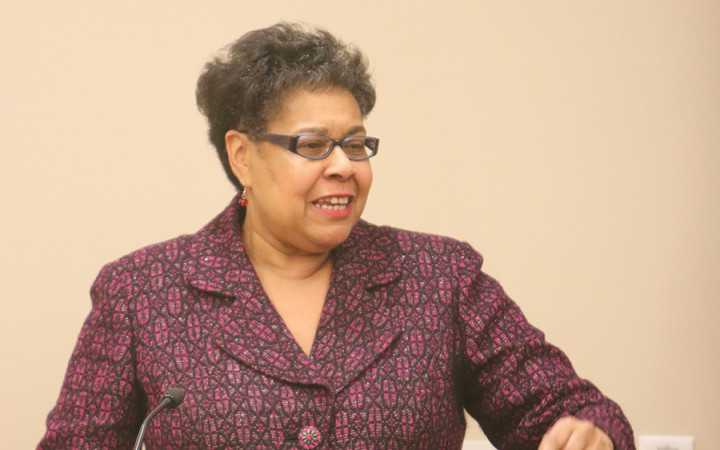People in the City of Keene got a first-hand look at what life was like in 1965 Selma, Alabama, when Shirley Jefferson visited to talk about her experiences.
Jefferson was just 12 years old when the Selma to Montgomery March for Voting Rights began in her hometown.
“I just happened to grow up in Selma, Alabama in a time that wasn’t so beautiful,” Jefferson said to a room full of citizens and Keene State College students in Centennial Hall of the KSC Alumni Center.
Jefferson said race relations where she lived were much different than they are now.
In fact, she could recall the first time she knew her skin color made a difference in her life.
“I saw a white girl with some ice cream, and I asked my father if I could have some ice cream, and he said ‘No.’ I asked ‘Why?’ He said, ‘Because we can’t go in and get it, because we’re black. We can’t go in those places, we can’t do the same things white people can do,’” Jefferson said, “From that very moment, I think I learned the difference between black and white,” she continued.
Experiences like this pushed Jefferson toward her career in law. “At an early age I decided I wanted to fight injustice,” she said.
Jefferson soon moved to Vermont and began studying law at Vermont Law School, much to the confusion of her father.
“I knew if I could just get out of Selma, it would be okay,” Jefferson said.
She said her father couldn’t believe she wanted to go somewhere so far north and actually feared for her life. “My father had never been to Vermont,” she explained.
“He lived in Selma — he lived in segregation all his life. All he had ever encountered was, ‘White people are bad for black people,’” she said.
Eventually though, her father was bragging about her success at college. Jefferson said that she thinks her father started to learn that compassion and love exist in the world because of how well she was treated in school. Jefferson graduated from Vermont Law in 1996.
Jefferson later recalled the first time she met Dr. Martin Luther King Jr. at a church in Alabama.
“Dr. King was up talking, and he had that booming voice and everyone was getting excited . . . ‘We want our freedom, we’ll fight for our freedom, we’ll die for our freedom.’ And I just remember that, when I really started getting involved,” she recalled.
KSC student Hersch Chaim brought up some of the black youth movements that are currently active in the country.
Chaim said he thinks that some of these movements surrounding Trayvon Martin and Michael Brown aren’t getting the same publicity from mainstream media as they did in the 1960s.
When asked her opinion on some of the more modern black youth movements, Jefferson expressed concern that they aren’t as prominent as they should or could be.
“I didn’t know black youth were doing this,” she said.
Professor Dottie Morris gave Jefferson some ideas as far as current youth movements.
“For example, the idea around the organization of Black Lives Matter, I think that’s more of a youth-motivated movement,” she said.
Morris went on to talk about what has happened in Ferguson, Missouri in regards to protests and even what happened years ago in New Orleans. In both those cases, the black community bonded together to try and fix something.
The theme to Jefferson’s discussion last Monday, March 2 eventually centered around making positive change in the world and speaking out against injustice.
“If you don’t like something that’s happening or you feel that something is not right, you might want to speak out and you might want to investigate it a little more,” Jefferson said.
Skyler Frazer can be contacted at sfrazer@kscequinox.com

